Deactivator - Study guides, Class notes & Summaries
Looking for the best study guides, study notes and summaries about Deactivator? On this page you'll find 40 study documents about Deactivator.
Page 2 out of 40 results
Sort by
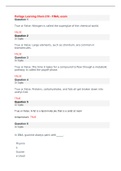
-
chem 210 final exam prep
- Exam (elaborations) • 18 pages • 2023
-
Available in package deal
-
- $16.00
- + learn more
True or False: Nitrogen is called the superglue of the chemical world. FALSE True or False: Large elements, such as strontium, are common in biomolecules. FALSE True or False: The time it takes for a compound to flow through a metabolic pathway is called the payoff phase. FALSE True or False: Proteins, carbohydrates, and fats all get broken down into acetyl-CoA. TRUE True or False: A fat is a lipid molecule that is a solid at room temperature. TRUE In DNA, guanine...
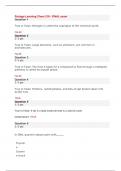
-
Portage Learning Chem 210 - FINAL exam
- Exam (elaborations) • 18 pages • 2023
-
- $15.49
- + learn more
True or False: Nitrogen is called the superglue of the chemical world. FALSE True or False: Large elements, such as strontium, are common in biomolecules. FALSE True or False: The time it takes for a compound to flow through a metabolic pathway is called the payoff phase. FALSE True or False: Proteins, carbohydrates, and fats all get broken down into acetyl-CoA. TRUE True or False: A fat is a lipid molecule that is a solid at room temperature. TRUE In DNA, guanine...

-
CHEM 210 EXAMS 1-8 AND FINAL EXAM
- Exam (elaborations) • 125 pages • 2023
-
- $14.49
- + learn more
CHEM 210 EXAMS 1-8 AND FINAL EXAM. chem 210 exams 1-8 and final exam. Question 1 3 / 3 pts True or False: According to the Module, a compound with a molecular mass of 1,000 g/mol is considered a macromolecule. True Correct! False Question 2 3 / 3 pts True or False: Biomolecules can have only two functional groups. True Correct! False Question 3 3 / 3 pts True or False: The following functional group is an alcohol. True Correct! False Question 4 3 / 3 pts True or False: I...
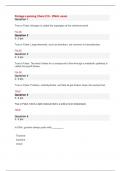
-
Portage Learning Chem 210 - FINAL exam
- Exam (elaborations) • 14 pages • 2023
-
- $14.99
- + learn more
True or False: Nitrogen is called the superglue of the chemical world. FALSE True or False: Large elements, such as strontium, are common in biomolecules. FALSE True or False: The time it takes for a compound to flow through a metabolic pathway is called the payoff phase. FALSE True or False: Proteins, carbohydrates, and fats all get broken down into acetyl-CoA. TRUE True or False: A fat is a lipid molecule that is a solid at room temperature. TRUE In DNA, guanine always pairs with . ...

-
CHEM 210 EXAMS 1-8 AND FINAL EXAM.
- Exam (elaborations) • 125 pages • 2023
-
- $16.99
- + learn more
CHEM 210 EXAMS 1-8 AND FINAL EXAM. chem 210 exams 1-8 and final exam. Question 1 3 / 3 pts True or False: According to the Module, a compound with a molecular mass of 1,000 g/mol is considered a macromolecule. True Correct! False Question 2 3 / 3 pts True or False: Biomolecules can have only two functional groups. True Correct! False Question 3 3 / 3 pts True or False: The following functional group is an alcohol. True Correct! False Question 4 3 / 3 pts True or False: I...
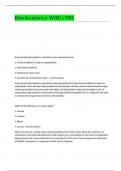
-
Biochemistry WGU c785 with correct answers 2023 2024
- Exam (elaborations) • 4 pages • 2023
-
Available in package deal
-
- $11.99
- + learn more
Biochemistry WGU c785 Nonenzymatic glycosylation or glycation creates glycoproteins by: 1. Chemical addition of sugars to polypeptides 2. Extracellular synthesis 3. Attaching 20 amino acids 4. Secretion into extracellular matrix - correct answer1 Nonenzymatic glycosylation or glycation creates glycoproteins by the chemical addition of sugars to polypeptides. Since this type of glycosylation is nonenzymatic, the time and the concentration of sugar control glycosylation. Because ...
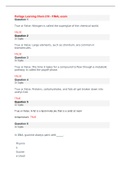
-
Portage Learning Chem 210 - FINAL exam
- Exam (elaborations) • 18 pages • 2022
-
- $20.29
- + learn more
True or False: Nitrogen is called the superglue of the chemical world. FALSE True or False: Large elements, such as strontium, are common in biomolecules. FALSE True or False: The time it takes for a compound to flow through a metabolic pathway is called the payoff phase. FALSE True or False: Proteins, carbohydrates, and fats all get broken down into acetyl-CoA. TRUE True or False: A fat is a lipid molecule that is a solid at room temperature. TRUE In DNA, guanine...
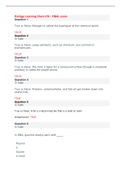
-
Portage Learning Chem 210 - FINAL exam
- Exam (elaborations) • 18 pages • 2022
-
- $23.49
- + learn more
True or False: Nitrogen is called the superglue of the chemical world. FALSE True or False: Large elements, such as strontium, are common in biomolecules. FALSE True or False: The time it takes for a compound to flow through a metabolic pathway is called the payoff phase. FALSE True or False: Proteins, carbohydrates, and fats all get broken down into acetyl-CoA. TRUE True or False: A fat is a lipid molecule that is a solid at room temperature. TRUE In DNA, guanine...
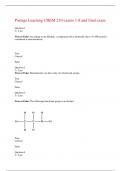
-
Portage Learning CHEM 210 exams 1-8 and final exam
- Exam (elaborations) • 124 pages • 2023
-
- $17.29
- + learn more
Portage Learning CHEM 210 exams 1-8 and final exam Question 1 3 / 3 pts True or False: According to the Module, a compound with a molecular mass of 1,000 g/mol is considered a macromolecule. True Correct! False Question 2 3 / 3 pts True or False: Biomolecules can have only two functional groups. True Correct! False Question 3 3 / 3 pts True or False: The following functional group is an alcohol. True Correct! False Question 4 3 / 3 pts True or False: In a eukaryotic cell, t...
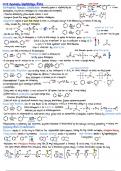
-
Aromatic substitution reactions
- Class notes • 2 pages • 2024
-
- $7.99
- + learn more
Mainly discusses electrophilic aromatic substitution but mentions nucleophilic reactions as well. Explains and defines activators and deactivators in terms of reactivity. Talks about sulfonation, nitration, Friedel Crafts alkylation and acylation, and halogenation reactions of aromatic compounds.

How much did you already spend on Stuvia? Imagine there are plenty more of you out there paying for study notes, but this time YOU are the seller. Ka-ching! Discover all about earning on Stuvia


